Survey of Music Literature 
Music 1261-010
COURSE OUTLINE |
|
 Note: This is an organic document! It will change. Note: This is an organic document! It will change.
You are responsible for what is on this page, not a copy you made at the beginning of the semester. |
Week 1 Jan. 8-12 | The Middle Ages: Chapters 11-13 Hildegard of Bingen Alleluia, O virga mediatrix Notre Dame School Organum Gaude Maria virgo Machaut Puis qu'en oubli Medieval & Renaissance instruments Indulgences The Black Death Medieval Map |  | Link to Course Outline On the top of this page, File - Send - Shortcut to desktop |  | WebCT setup Log on to WebCT6 Click “My Settings” in the upper right portion of the screen. Select “My profile” tab and edit the profile to include the email address you actually check. Click Save. Now click on “My Tool Option” tab and scroll to the Mail portion of the screen. Select the box “Forward all mail messages to the e-mail address in my profile.” Click Save.
|  | CPS setupClickers Your class key is G25630C547 (case sensitive) |  | Due Thurs Study Guide M1 Listening CD 1: 1-10CPS setup |
|
Week 2 Jan. 15-19 | The Renaissance: Chapters 14-16, TransitionJosquin Ave Maria Palestrina Pope Marcellus Mass, Gloria Farmer Fair Phyllis Renaissance Map 
"Nothing on earth is so well suited to make the sad merry, the merry sad, to give courage to the despairing, to make the proud humble, to lessen envy and hate, as music."
--Martin Luther |
The Baroque: Chapters 19-24 Purcell Dido and Aeneas, Act III, Dido's LamentStrozzi Begli occhi Bach Cantata No. 80, A Mighty Fortress Is Our God (No. 1, Choral fugue, No. 8, Chorale) Handel Messiah (No. 18, "Rejoice greatly" No. 44, "Hallelujah")
|  | Due Tues Study Guide M1 Listening CD 1:11-20 | | | |
 | Due ThursStudy Guide M1 Listening CD 1:21-44 |
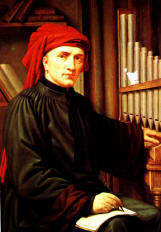 |  | Josquin de Prez c. 1450-1521 | Giovanni Pierluigi da Palestrina c.1526-1594 |
|
Week 3 Jan. 22-26 | The Baroque: Chapters 25-26 Vivaldi Spring from The Four Seasons 1st movement Handel Water Music, Suite in D major Alla hornpipe Bach Prelude and Fugue in C minor, from WTC, Book I Map in Baroque eraReview for Unit Test #1 Study Sheet Sample Test What is classical music?? |  | Due Tues Study Guide M1 Listening CD 1: 45-59 | | | |

| 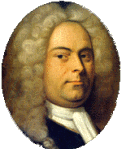
| Johann Sebastian Bach 1685-1750 | George Frideric Handel 1685 - 1759 |
|
Week 4 Jan. 29-Feb. 2 | Unit Test #1 |  | Tues: Unit Test #1 | | | |  | Due Thurs Study Guide M1 Listening CD 1: 60-79 CD 2: 1-7 |
|
Week 5 Feb. 5-9 | 18th Century Classicism |  | Due Tues Study Guide M1 Listening CD 2: 8-48 | | | 
Franz Joseph Haydn 1732-1809 |
|
Week 6 Feb. 12-16 | 18th Century Classicism (cont.)
Mozart Eine kleine Nachtmusik, K. 525 Haydn Symphony No. 94 in G major (Surprise), 2nd mvt. Beethoven Symphony No. 5 in C minor, Op. 67 Mozart Piano Concerto in G major, K. 453, 1st mvt. Beethoven Piano Sonata in C min, Op. 13 (Pathetique) 2nd mvt. Mozart The Marriage of Figaro Act 1, Scenes 6 and 7 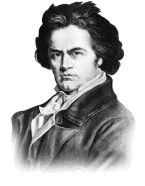
Ludwig Van Beethoven 1770-1827 No class on Thursday (TMEA) | |
Week 7 Feb. 19-23 | 18th Century Classicism (cont.) Drag cities onto the European map | |
Week 8 Feb. 26 -Mar 2 | The Nineteenth-Century
Schubert Erlking
Robert Schumann "And if the flowers knew," from A Poet's Love, No. 8 Chopin Nocturne in C minor, Op. 48, No. 1 Clara Schumann Scherzo, Op. 10 Berlioz Symphonie fantastique 4th mvt. Smetana The Moldau Brahms Symphony No. 3 in F major, Op. 90, 3rd mvt. Brahms A German Requiem, 4th mvt. Verdi Rigoletto, Act III, excerpts Wagner Die Walkure Act III, Farewell and Magic Fire Music Puccini Madame Butterfly, "Un bel di" Japanese Kouta A White Fan Tchaikovsky The Nutcracker, March | Romanticism Timeline |
Week 9 Mar. 5-9 | The Nineteenth-Century (cont.) An efficiency consultant gave his critique of Schubert's Unfinished Symphony: - For a considerable period, the oboe players had nothing to do. Their number should be reduced and their work spread over the whole orchestra, thus avoiding peaks of inactivity.
- All 12 violins were playing notes. This seems unnecessary duplication of activity, and the staff of this section should be drastically cut. If a large volume of sound is really required, this could be obtained through the use of a single, much less costly amplifier.
- Much effort was involved in playing the 16th notes. This seems an excessive refinement, and it is recommended that all notes be rounded up to the nearest eighth note. Not only would this increase efficiency, but it would then be possible to use paraprofessionals instead of experienced musicians.
- No useful purpose is served by repeating with horns the passage that has already been handled by the strings. If such redundant passages were eliminated, the concert could be reduced from two hours to 20 minutes with attendant savings in staff wages.
- This symphony had two movements. If Schubert didn't achieve his musical goals by the end of the first movement, then he should have stopped there. The second movement is unnecessary and should be cut.
- In order to avoid such wastefulness in future, it is further suggested that any composer who is writing a symphony should have to get preauthorization, for, say, 12 lines at a time.
In light of the above, one can only conclude that had Schubert given attention to these matters, he probably would have had the time to finish his symphony. |
| 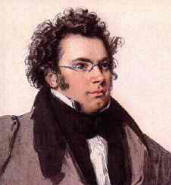 Franz Schubert 1797-1828
|
 SPRING BREAK SPRING BREAK
|
Week 10 Mar. 19-23 | The Nineteenth-Century (cont.) | |
Week 11 Mar. 26-30 | 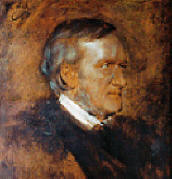 | 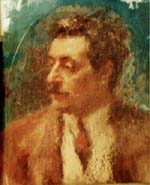 | Richard Wagner 1813-1883 | Giacomo Puccini 1858-1924 |
|  | Due Tues No Study Guide due today. We will catch up on the listening selections in preparation for Thursday's exam. |  | Due Thurs Romantic Era Exam | | | |
Wagner's Ring Cycle for Dummies The Evolution of the Orchestra |
Week 12 Apr. 2-6 | The Twentieth Century
Debussy Prelude to "The Afternoon of a Faun" Stravinsky The Rite of Spring, Part II Glorification of the Chosen One Evocation of the Ancestors Ritual Action of the Ancestors Schoenberg Pierrot lunaire No. 18, The Moonfleck Bartok Interrupted Intermezzo, from Concerto for Orchestra Copland Billy the Kid, Scene 1, Street in a Frontier Town Revueltas Homenaje a Federico Garcia Lorca, 3rd mvt, Son
| 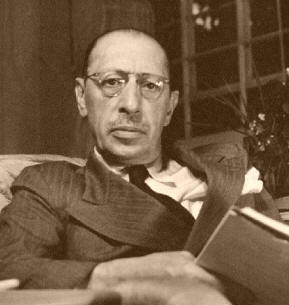 |  | Igor Stravinsky 1882-1971 | Arnold Schoenberg 1903 -1990 |
|
Week 13 Apr. 9-13 | The New Music Crumb Ancient Voices of Children, 1st mvt. Ligeti Disorder, from Etudes for Piano, Book I Lansky Notjustmoreidlechatter, excerpt Tower For the Uncommon Woman Part Cantate Domino canticum novum Adams Roadrunner, from Chamber Symphony | |
Week 14 Apr. 16-20 | | | | |  | Due Thurs Twentieth Century Exam | | | |
|
Week 15 Apr. 23-27 | Review for Final Exam
Composer Table
Web CT Practice Test Last class day: Tue., April 24
(Final Exam time: Wednesday, May 2, 11:30am-2:00pm)
|  | Tues: Drop the Needle Pre-test | | | | | | |
|
Information for Final Exam Below is a list of composers which you will have to enter into WebCT as answers for the listening portion of the test. They must be spelled correctly or they will be counted wrong. | Adams | Bach | Bartok | Beethoven | Berlioz | | Brahms | Chopin | Clara Schumann | Copland | Crumb | | Debussy | Handel | Haydn | Hildegard | Josquin | | Lansky | Ligeti | Machaut | Mozart | Notre Dame | | Palestrina | Puccini | Revueltas | Schoenberg | Schubert | | Schumann | Smetana | Stravinsky | Strozzi | Tchaikovsky | | Tower | Verdi | Vivaldi | Wagner | |
Make note of the following, in particular:
For Clara Schumann, use her full name. For Robert, just the last name. Notre Dame refers to the school where Gaude Maria was written, but will be used in place of the composer for that question. Don't just look at the names. Practice spelling them (like Tchaikovsky and Schoenberg).
|
|